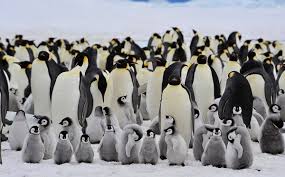Emperor Penguins : Study

A study revealed that emperor penguins are the iconic species threatened by climate change in Antarctica.
- Emperor penguins are the tallest and heaviest penguin alive today.
- They evolved about one million years ago, and are highly adapted to life in one of Earth’s harshest environments
- Adults are coloured black and white with areas of orange and yellow on the head, neck, and breast.
- They gain and lose weight rapidly during breeding and feeding seasons. On average, females tend to weigh less than males.
- They have two layers of feathers, a good reserve of fat, and proportionally smaller beaks and flippers than other penguins to prevent heat loss.
- They also huddle close together in large groups to keep themselves and each other warm.
- They are capable of diving to depths of approximately 550 metres (1,800 feet) in search of food; they are the world’s deepest-diving birds.
- They breed in the winter.
- Lifespan: 15 to 20 years
- They are found throughout the Antarctic continent and sub-Antarctic islands.
- In breeding months (April to November), emperor penguin colonies are found between 66° and 78° south latitude along the Antarctic coastline.
- It is the most ice-adapted of any penguin species, inhabiting pack ice and surrounding marine areas. They spend their entire lives on Antarctic ice and in its waters.
- Conservation Status: IUCN Red List: Near Threatened.




